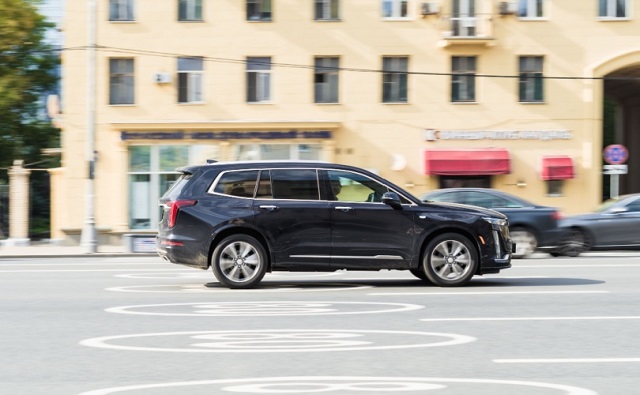Automotive
High-tech cars are secretly spying on drivers, resulting in insurance rejections: NYT report

From LifeSiteNews
Many Americans’ driving habits are monitored without their knowledge or consent, and their driving data is being used to make decisions about insurance coverage and rates.
A lawsuit accuses General Motors of spying on a Florida man’s driving habits via his 2021 Cadillac XT6, resulting in his rejection by seven auto insurance companies.
The man, Romeo Chicco, is also suing LexisNexis, the company that shared his data with the insurance companies.
The New York Times reported:
Modern cars have been called “smartphones with wheels,” because they are connected to the internet and packed with sensors and cameras. According to the complaint, an agent at Liberty Mutual told Mr. Chicco that he had been rejected because of information in his “LexisNexis report.” LexisNexis Risk Solutions, a data broker, has traditionally kept tabs for insurers on drivers’ moving violations, prior insurance coverage and accidents.
When Mr. Chicco requested his LexisNexis file, it contained details about 258 trips he had taken in his Cadillac over the past six months. His file included the distance he had driven, when the trips started and ended, and an accounting of any speeding and hard braking or accelerating. The data had been provided by General Motors — the manufacturer of his Cadillac.
Chicco had downloaded the MyCadillac app, and “was eventually told that his data had been sent via OnStar — G.M.’s connected services company, which is also named in the suit — and that he had enrolled in OnStar’s Smart Driver program, a feature for getting driver feedback and digital badges for good driving.”
Another New York Times report explored the extent to which car manufacturers and insurance companies are able to access data about drivers: a man whose insurance rates increased by 21 percent learned that LexisNexis had “more than 130 pages detailing each time he or his wife had driven the [Chevrolet] Bolt over the previous six months. It included the dates of 640 trips, their start and end times, the distance driven and an accounting of any speeding, hard braking or sharp accelerations. The only thing it didn’t have is where they had driven the car.
As cars become increasingly high-tech, freedom and civil liberties advocates like Republican U.S. Rep. Thomas Massie of Kentucky have warned that such features may become weaponized. For example, a 2021 federal law mandates that by 2026 new cars have a “kill switch” by which they be disabled from afar – supposedly an anti-drunk driving measure. As LifeSiteNews has reported, manufacturers must put a system in cars that can “passively monitor the performance of a driver of a motor vehicle to accurately identity whether that driver may be impaired” and can stop or limit “motor vehicle operation” if “impairment is detected.”
Automotive
Tesla Vandals Keep Running Into The Same Problem … Cameras


From the Daily Caller News Foundation
By Hudson Crozier
People damaging Teslas in anger toward their owners and Elon Musk aren’t picking up on the fact that the vehicles have multiple cameras capable of catching them in the act.
At least nine perpetrators have been caught on video keying, writing graffiti or otherwise defacing Tesla vehicles in parking lots across the U.S. in the month of March alone. Most have led to an arrest or warrant based partly on the footage, which Tesla’s “Sentry Mode” automatically films from the side of the unattended vehicle when it detects human activity nearby.
“Smile, you’re on camera,” Tesla warned in a March 20 X post about its Sentry Mode feature. Musk’s company has been working to upgrade Sentry Mode so that the vehicles will soon blast music at full volume when vandals attack it. The camera system, however, has not stopped an increasing number of vandals from singling out Tesla owners, usually in protest of Musk’s work in the Trump administration for the Department of Government Efficiency (DOGE).
One incident happened on March 29, the same day leftists coordinated protests around the country for a “Global Day of Action” against Musk. That Saturday also saw alleged instances of violence at protests. The demonstrations stemmed from an online call to action by groups such as the Disruption Project, which encourages activists to foment “uprisings,” find a “target’s” home address and other confrontational tactics.
Tesla’s press team did not respond to a request for comment.
One man allegedly caught on camera keying a Tesla SUV on March 24 apologized to the owner who confronted him in a parking lot in Pennsylvania, police and media reports said. The man faces charges of criminal mischief, harassment and disorderly conduct for allegedly carving a swastika onto the vehicle.
“I have nothing against your car, and I have nothing against you,” the suspect said while the owner filmed him in the parking lot. “Obviously, I have something against Elon Musk.” The man called his own behavior “misguided.”
The defendant’s lawyer told Fox News his “client is a proud father, long-time resident, and is currently undergoing cancer treatment” and that he would not comment publicly “pending the outcome of the case.”
One of the most aggressive acts caught by Sentry Mode was in the case of a man who drove an ATV-style vehicle into a Tesla on March 25. Texas police identified the man as Demarqeyun Marquize Cox, arrested him and said he allegedly gave two other nearby Teslas the same treatment while also writing “Elon” on them. The public defender office representing Cox did not respond to a voicemail from the Daily Caller News Foundation.
Tesla cameras also caught three other people in Florida, Texas and Arizona keying and smearing bubble gum on the vehicles in March. The three suspects named by police do not have attorneys listed in county records available for contact.
Many of the vandalism cases since Trump’s return have reportedly caused thousands of dollars in damage for individual owners. For example, the bubble gum incident in Florida brought $2,623.66 in costs, while another keying incident in Minnesota brought $3,200.
Some reported attacks on Tesla vehicles and chargers have gotten the attention of federal law enforcement, including cases of alleged firebombing or shooting.
Two other suspected vandals in New York, one in Minnesota and one in Mississippi have reportedly avoided arrest for now — with one owner declining to press charges — but were all seen on the Teslas’ cameras scratching up the vehicles. Police identified the Mississippi suspect as an illegal migrant from Cuba.
One Tesla owner in North Dakota ridiculed a man who allegedly carved the letter “F” into his Cybertruck in a Costco parking lot — as seen on the Cybertruck’s camera. The defendant faces charges of criminal mischief, and county records say he is representing himself in court.
“I can’t believe this guy is potentially ruining his life to follow a political ideology,” the owner told WDAY News.
“If you’re going to vandalize these vehicles, you’re going to get caught,” the owner said.
Automotive
Dark Web Tesla Doxxers Used Widely-Popular Parking App Data To Find Targets, Analysis Shows


From the Daily Caller News Foundation
By Thomas English
A dark web doxxing website targeting Tesla owners and allies of Elon Musk appears to be compiled from hacked data originally stolen from a massive ParkMobile app breach in 2021, according to records obtained by a data privacy group.
The site, known as DogeQuest, first appeared in March and publishes names, home addresses, contact details and other personal information tied to Tesla drivers and DOGE staff. Marketed as a hub for anti-Musk “creative expressions of protest,” the platform has been linked to real-world vandalism and remains live on the dark web. Federal investigations into DogeQuest are already underway, the New York Post first reported.
“If you’re on the hunt for a Tesla to unleash your artistic flair with a spray can, just step outside — no map needed! At DOGEQUEST, we believe in empowering creative expressions of protest that you can execute from the comfort of your own home,” the surface-web DogeQuest site reads. “DOGEQUEST neither endorses nor condemns any actions.”

A screenshot of the DogeQuest surface website captured on April 3, 2025. (Captured by Thomas English/Daily Caller News Foundation)
ObscureIQ, a data privacy group, compiled a breakdown of the data — obtained by the Daily Caller News Foundation — and determined 98.2% of records used to populate the site matched individuals affected by the 2021 ParkMobile breach.
Encouraging destruction of Teslas throughout the country is extreme domestic terrorism!! https://t.co/8TCNIbrQxA
— Elon Musk (@elonmusk) March 18, 2025
DogeQuest originally appeared as a surface web doxxing hub, encouraging vandalism of Teslas and displaying names, addresses, contact details and, in some cases, employment information for roughly 1,700 individuals. The site used stolen ParkMobile records along with data purchased from brokers, flagging anyone who had a Tesla listed in their vehicle registration profile, according to ObscureIQ’s analysis.
The platform — now operating as “DogeQuest Unleashed” via a .onion dark web address — has also published personal details of high-value targets including senior military officials, federal employees and private sector executives in Silicon Valley. A spreadsheet reviewed by the Daily Caller News Foundation indicates several individuals targeted work areas like cybersecurity, defense contracting, public health and diplomatic policy. DOGE staff and their families appear prominently throughout the data.

A screenshot of DogeQuest’s surface website, captured on April 3, 2025. (Captured by Thomas English/Daily Caller News Foundation)
No other reporting has yet tied DogeQuest directly to the ParkMobile breach, which impacted over 21 million users in 2021. The company, which facilitates cashless parking across the U.S., quietly disclosed the breach in April of that year, admitting that “basic user information” had been accessed. ObscureIQ’s research shows that exposed data included email addresses, license plate numbers and phone numbers — enough to triangulate identity when paired with commercial data brokers.
The company agreed to a $32 million settlement to resolve a class-action lawsuit stemming from the data breach. The lawsuit alleged that ParkMobile failed to secure its Amazon Web Services cloud storage, allowing access to the data. Although payment data were reportedly not compromised, plaintiffs argued the exposed information still posed serious privacy risks — a claim now reinforced by its use in the DogeQuest doxxing campaign.
Despite federal attention, the site has proven difficult to keep offline, as the dark web mirror incorporates anonymized hosting methods, frustrating law enforcement takedown efforts.
The Department of Justice charged three suspects last week linked to physical attacks on Tesla vehicles, charging stations and dealerships across multiple states, though it has not publicly confirmed any link between those suspects and DogeQuest. Meanwhile, the FBI has acknowledged it is “actively working” on both the doxxing campaign and a parallel rise in swatting incidents affecting DOGE affiliates.
-

 2025 Federal Election1 day ago
2025 Federal Election1 day agoPoilievre To Create ‘Canada First’ National Energy Corridor
-

 2025 Federal Election2 days ago
2025 Federal Election2 days agoMainstream Media Election Coverage: If the Election Was a NHL Game, the Ice Would be Constantly Tilted Up and to the Left
-

 International2 days ago
International2 days agoFREE MARINE LE PEN!’: Trump defends French populist against ‘lawfare’ charges
-

 COVID-191 day ago
COVID-191 day agoMaxime Bernier slams Freedom Convoy leaders’ guilty verdict, calls Canada’s justice system ‘corrupt’
-

 Automotive1 day ago
Automotive1 day agoDark Web Tesla Doxxers Used Widely-Popular Parking App Data To Find Targets, Analysis Shows
-

 Carbon Tax1 day ago
Carbon Tax1 day agoThe book the carbon taxers don’t want you to read
-

 Business1 day ago
Business1 day agoWill Trump’s ‘Liberation Day’ Tariffs End In Disaster Or Prosperity?
-

 Censorship Industrial Complex1 day ago
Censorship Industrial Complex1 day agoChina announces “improvements” to social credit system







